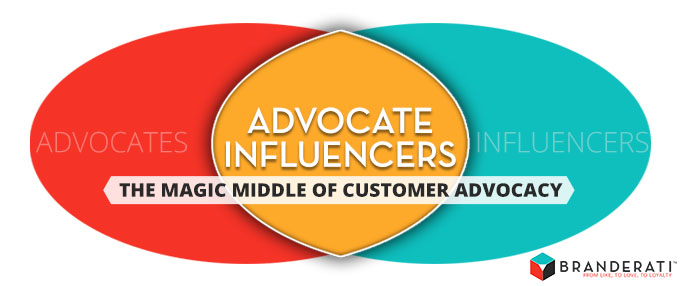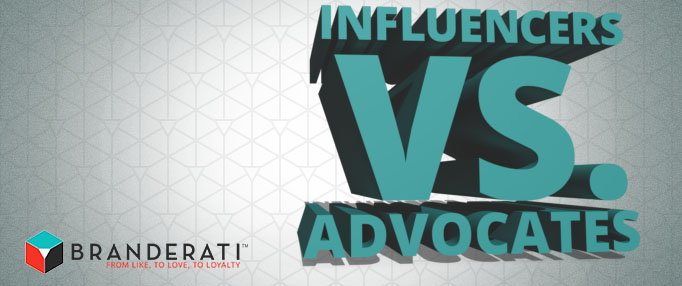There is an ongoing debate over which is the best group of people to use to spread the message of your brand: influencers or advocates. Let’s have a look at both groups to see why you would work with them and the benefits and drawbacks of each.
Influencers are people who have a wide reach and many followers. They may be celebrities or they may be influential figures in their industries: experts, bloggers, columnists or authors. They may be several of these things at once. The main reason that a company would use influencers is because of their reach: that they can convey a message to many people in a short period of time, with the hope that such a ‘celebrity’ endorsement will encourage more people to buy a product or use a service. Influencers are usually paid for their promotion and are often used as a short-term face of a brand.
Advocates don’t need to be paid to talk about your brand: they tell all their friends how your product revolutionized their life, made it easier, or how they just love going into your store because of a great environment or fantastic service. If advocates follow their favorite brands online, they will share their posts and comment on photos because they want to be a part of the conversation. Advocates stay loyal to the brands they love and will sign up to information about an upcoming product because they are excited about its release. They might not have the reach of the influencers, but their network unmistakably knows about their passion for their favorite brands and they have high influence within their own communities.
Knowing Your Goal
If your brand wants to convey the message to the new audiences, which group do they choose to engage: influencers or advocates? This is the question we consistently get from our clients. Seemingly an easy one to answer, there are a number of factors we recommend them to consider. Before committing to a certain marketing strategy, think hard about the objectives you are trying to achieve. Here are just some of the considerations:
- Short-term versus long-term. Influencers have access to a large number of followers. If your goal is high volume of short-term buzz, you might choose an influencer to reach the maximum number of people in the shortest time. But if your goal is to build positive word of mouth that lasts for years, then you might want to build your own dedicated communities/networks of advocates who will continue to talk about your brand long after everyone has forgotten about your latest marketing campaign.
- Genuine passion. People tend to believe the word of someone who is not being paid for their recommendation over the ones who are. There have been a number of instances of celebrities and influencers endorsing brands that they themselves are not likely to use in their own lives, creating what I call a “relevancy disconnect”; or of brands changing spokespeople so often that the message gets confused. Organic, sustainable brand love is much stronger than paid love. Advocates are trusted by their immediate circles of friends/family/followers because of their genuine positive experiences with a brand or product, and that can be a very persuasive tool.
- Celebrity gloss. If you are looking for a glossy image for your brand you might turn towards a glamorous celebrity over more every-day users. Many brands choose people who are famous for their lifestyle to lend a touch of glamour to their marketing messages.
- Expert testimonial. An endorsement from someone who is an expert in their field can be highly persuasive for selling a product. Think of all those book jackets or movie posters that feature rave reviews from famous authors or respected critics. That level of expertise can be hard to find among your more average users, though not impossible.
- Product knowledge. Influencers don’t necessarily have deep knowledge of the brand or product they are recommending (although this depends on the influencer), whereas an advocate is more likely to have a real understanding and can answer questions from interested potential customers with more precision. If you want to build up a conversation around your brand, using influencers may uncover a superficial relationship with a product, whereas advocates can offer genuine insight and help.
- Reciprocation. Influencers expect payment from the relationship, whereas brand advocates will talk about products without expecting to be remunerated. Investing in an influencer takes money, whereas investment in your brand advocates takes time and effort to build relationships. It is simple to put money towards an influencer campaign, but building sustainable advocacy can take far longer.
Advocate Influencers: the Way Forward
At the end of the day, it doesn’t have to be a choice between influencers and advocates. For the savvy brand, developing networks of advocate influencers is the way forward to real, genuine, long-term marketing success. At BRANDERATI we coined the term advocate influencers, which represents the golden middle – an intersection of people with wide reach who are already committed to your products and already endorse them in their daily lives. Example of this would be Walmart Moms blogger team.

Another option would be finding celebrities who are fans of your product before you sign an agreement with them, as Weight Watchers did when they approached former ‘Saturday Night Live’ cast member Ana Gasteyer, who was tweeting about using their points system to lose weight. But not every brand will have access to a celebrity like that; and most of the time it’ll still require investment to engage that celebrity to be your spokesperson longer-term.
In closing…
It is important to remember that even consumers who don’t have wide reach, when brought together, can build up a real long-term momentum and ignite true movement around your brand. After all, scientists proved that it only takes 10% of the population holding an unshakable belief to influence the rest of the population. To inspire advocate influencers, you need to build in customer engagement into every level of your interaction with your users, and encourage feedback, user-generated content, as well as provide easy ways and tools for them to discuss your brand online. This requires a solid platform (to help you build sustainable networks with your advocates / influencers, engage them, and measure the impact); a long-term commitment; and a sprinkle of imagination for sustainable engagement. That, fueled by true respect and reciprocal love towards your customers, will help elevate your brand to new heights. And that is your brand’s goal, isn’t it?
Originally Published on ClickZ
Organic, sustainable brand love is much stronger than paid love. Click To Tweet It only takes 10% of the population holding an unshakable belief to influence the rest of the ... Click To Tweet
